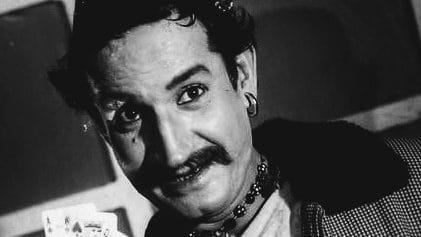When veteran actor Jeevan Kumar appeared on the classic Doordarshan chat show Phool Khile Hain Gulshan Gulshan decades ago, the host, Tabassum, couldn’t help but ask him the burning question — how many times had he actually played the character of the sage Narad Muni in mythological films over the years? Her guess was 40. “Actually, 49,” he corrected her with half-modesty, half-pride.
“Yeh record toote ya bane ya rahe, iss ki toh maine kabhi khair parvah nahin ki, lekin mere khayal mein inn filmon mein maine maha muni ki kaafi publicity kar di”, he said with a smile. (Whether this record stays or is broken is not something I’ve ever bothered about, but I do feel that through these films, I have managed to give Narad Muni quite a bit of publicity.)
Jeevan Kumar’s rendition of the Vedic sage has become intrinsically embedded in a multi-generational idea of the musical storyteller who was part of the Mahabharat, Ramayan as well as Puranic folklore. The actor bemusedly told Tabassum that Marathi newspaper Loksatta even once wrote that if Narad were ever to descend upon Earth, people would assume he was an imposter if he didn’t match Kumar’s signature twang when saying “Narayan, Nararyan”.
But Jeevan Kumar wasn’t just Narad Muni, he was also one of Hindi cinema’s most iconic villains. On his 33rd death anniversary, here is a look at some of the prolific actor’s best work.
Also read: Iftekhar, Bollywood’s favourite cop, was also an exceptional painter
From Reflector Boy to villain with swag
Originally named Omkar Nath Dar, Kumar was born into a Kashmiri Pandit family in Srinagar. His father was the Governor of Gilgit (now in Pakistan-Occupied Kashmir). With 23 siblings, Kumar had a chaotic childhood as his mother passed away during childbirth and his father died when he was only three years old.
Having always harboured the dream of becoming a photographer, he ran away to Mumbai with Rs 26 in his pocket, in the hope of acquiring enough skills to eventually open a small photography studio in Kashmir.
After hustling his way through the city, along with some help from distant relatives, he found an odd job on the movie set of director Mohan Sinha. Kumar was given the task of sticking bits of silver paper onto chunks of wood in order to fashion makeshift light reflectors, hence earning the moniker “Reflector Boy” on sets.
Through sheer luck, he caught the eye of the director who asked him to recite a few lines. Taken by his mannerisms, he offered Kumar his first role in the 1935 film, Fashionable India.
It was these very distinct mannerisms that became characteristic to the actor and evolved with each film he did. In his interview to Tabassum, he demonstrated a few of his favourite ones.
His son Kiran Kumar, who also went on to become an actor, remembers these mannerisms fondly. “My father was a master in the school of style. He had a peculiar approach towards his characters, and he always applied his mannerisms to his roles. I never copied these mannerisms, but many of his colleagues did. They’re all doing well now thanks to my father,” he said in a 2016 interview.
He also set the record straight on the number of times his father played Narad Muni — a grand total of 61, a feat that, according to him, is unprecedented in world cinema.
But beyond the mischievous sage, Jeevan also became everyone’s favourite villain. In his long, prolific career, he played countless villains — sometimes with sartorial style like his character of Robert in the 1977 blockbuster Amar Akbar Anthony, sometimes exploring complex pathos like in 1960’s Kanoon, sometimes as a lecherous wretch like in the 1948 Dilip Kumar-starrer Mela and sometimes with excellent comic timing like in 1973’s Teen Chor.
Kiran Kumar, however, is particularly proud of his father’s performance in Kohinoor (1960). The sequence in which Jeevan Kumar and Dilip Kumar mime a sort of faceoff with what should be a mirror in between them, he feels, is “one of the most memorable scenes of Indian cinema”.
Also read: Raj Kapoor’s Awara is all the more relevant in the context of India’s migrant crisis






